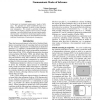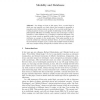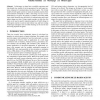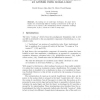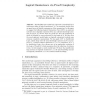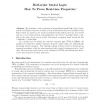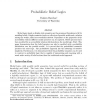ICALP
2010
Springer
15 years 2 months ago
2010
Springer
Abstract. The HalpernShoham logic is a modal logic of time intervals. Some eort has been put in last ten years to classify fragments of this beautiful logic with respect to decid...
AAAI
2008
15 years 2 months ago
2008
In this paper we investigate nonmonotonic `modes of inference'. Our approach uses modal (conditional) logic to establish a uniform framework in which to study nonmonotonic co...
88
Voted
TABLEAUX
2000
Springer
15 years 4 months ago
2000
Springer
Two things are done in this paper. First, a modal logic in which one can quantify over both objects and concepts is presented; a semantics and a tableau system are given. It is a n...
141
Voted
FOSSACS
2006
Springer
15 years 4 months ago
2006
Springer
In recent years, a tight connection has emerged between modal logic on the one hand and coalgebras, understood as generic transition systems, on the other hand. Here, we prove tha...
94
Voted
ECAI
2006
Springer
15 years 4 months ago
2006
Springer
In this paper, we show how to establish correctness and time bounds (e.g., quality of service guarantees) for multi-agent systems composed of communicating rule-based agents. The f...
DEON
2006
Springer
15 years 4 months ago
2006
Springer
Abstract. By making use of modal logic techniques, the paper disentangles two semantically different readings of statements of the type X counts as Y in context C (the classificato...
115
click to vote
CSL
2006
Springer
15 years 4 months ago
2006
Springer
The Hintikka-style modal logic approach to knowledge has a well-known defect of logical omniscience, i.e., an unrealistic feature that an agent knows all logical consequences of he...
111
click to vote
CADE
2006
Springer
15 years 4 months ago
2006
Springer
We introduce a Presburger modal logic PML with regularity constraints and full Presburger constraints on the number of children that generalize graded modalities, also known as num...
132
click to vote
PODC
1990
ACM
15 years 4 months ago
1990
ACM
Abstract. We introduce a novel extension of propositional modal logic that is interpreted over Kripke structures in which a value is associated with every possible world. These val...
96
Voted
ECAI
1990
Springer
15 years 4 months ago
1990
Springer
Modal logics based on Kripke style semantics are the prominent formalismin AI for modeling beliefs. Kripke semantics involve a collection of possible worlds and a relation among t...

